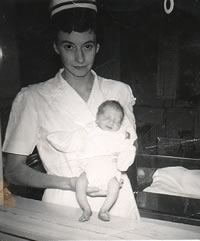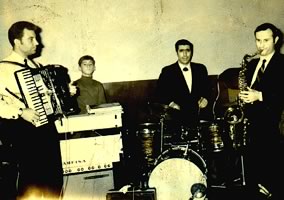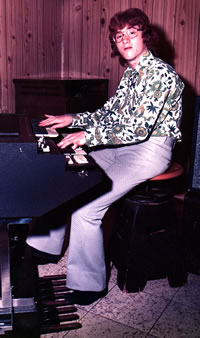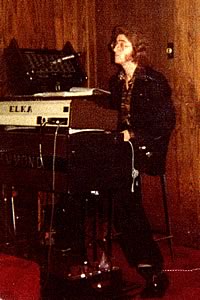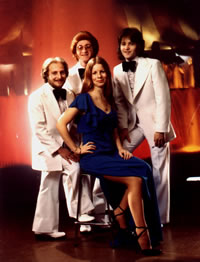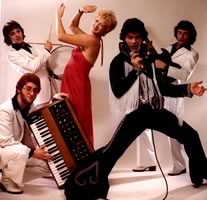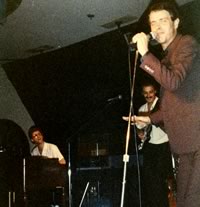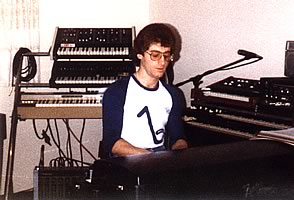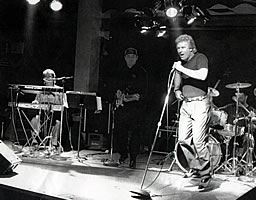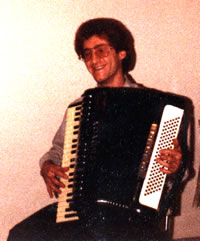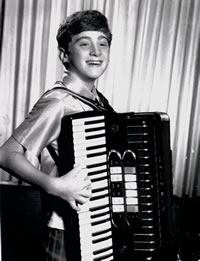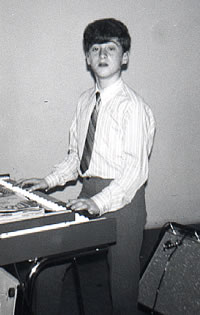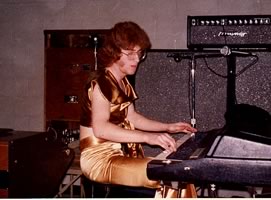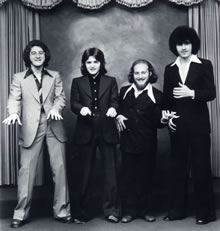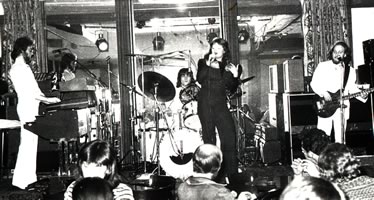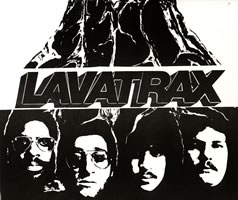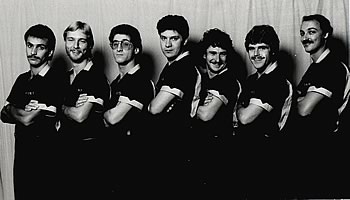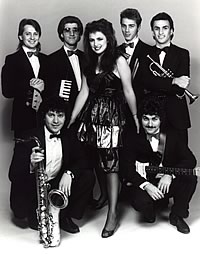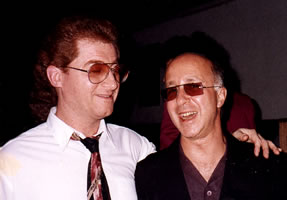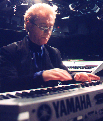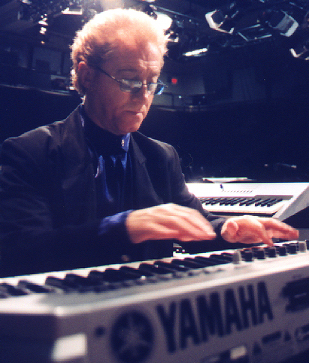I was born in Toronto, Canada. Being of Italian descendant, I started taking accordion lessons at the age of 5 (it's a given!) and continued on for 10 years with my first instructor, Gino Montanaro. At the age of 8, I started playing in a band with my father who is also an accordionist. Together, we played weddings and parties. At the age of 10, I decided I wanted to play the organ . At school, my friends would tease me about the accordion. Playing the organ was much "cooler". My Dad and I made a deal: he would buy me an organ, however, I would still have to continue taking accordion lessons. I agreed. I then received a "Farfisa Fast Four" organ, and, bonus --- a set of Stewart drums.
Now, I started playing organ in the band. At that time, we didn't have a bass player, so I played left hand bass on my Fast Four. Looking back, I realize that this was the start of my left hand independence. At 14, I wanted to take organ lessons at the Royal Conservatory of Music of Toronto, however they informed me that I would need grade 8 piano in order to feel confident with my hands so I could concentrate on my feet. They referred a piano teacher, Miss McGavin, and so I began. The only problem was, I didn't have a piano, so for the first 4 months, I rented a room at the Conservatory to practise my lessons everyday. Seeing my determination, my Dad then purchased an apartment size Heinzman.

My accordion lessons were paying off--I passed my grade 5 piano exam the first year. It was just a matter of getting my left hand together. I had to get my left hand used to playing keys on a keyboard, as opposed to buttons on an accordion. At this point, I was playing organ on gigs while continuing accordion and piano lessons. Theory and rudiments classes soon followed, as they are required inorder to complete piano practical exams. I also started teaching accordion and beginner piano.
In high school, I took trumpet and drums, utilizing both instruments in the school bands. At the same time, I was listening to bands like Santana, Deep Purple, Emerson, Lake and Palmer, Gino Vannelli and jazz greats like Oscar Peterson and Jimmy Smith. While listening and studying, I was gigging at the school dances with my band. We had a rock and commercial repertoire, however, our wedding gigs also skilled us with the walzes, polkas, beguines, fox trots, tarantellas, etc. I didn't realize it then, but these were training grounds that helped me gain experience and versatility. The ultimate goal for my band at that time was to do rock gigs.
At 15, my Dad purchased a Hammond Porta B. A B3 was a little out of the budget at that time, however, the Porta B was a great stepping stone. The accordion lessons began to take a back seat, but I still played it on certain gigs, or for Dad when he asked. He soon retired from the wedding band.

At this point, I took over, and now had a bass player in the unit. Since I was really focusing on piano, I was able to skip a Conservatory grade and move straight to grade 7 only one year after completing my grade 5. I'm now 16 years old, and playing with a wide variety of bands. These range from continental, ethnic, country, rock, R&B, while keeping up with classical lessons at the Conservatory. It is also at this point I started experimenting with jazz, as I'm discovering jazz heavies like Charlie Parker, John Coltrane, Herbie Hancock, Bill Evans, and of course, Chick Corea.
Listening to all these kinds of music made it a little difficult for me to put forth my full attention on grade 8 piano, history and harmony lessons. I would cram at the end and somehow managed to pull it off with honours. My teaching had also expanded from private lessons to local music stores. There were an abundant number of piano, accordion and organ students. My schedule was so full that practise time was hard to find. My poor teacher had so much patience!
When I completed my grade 8 piano, my teacher informed me that I could now take organ lessons. This was the day I was waiting for, however now I felt differently about it. It became apparent to me that I had a great teacher, one who knew both my strong and weak points. I didn't want to stop studying with her just yet. Having a teacher who worked so well with my abilities was hard to give up. (Besides, she got a kick out of me when I would play the blues and just improvise).
At 17, I had a ton of club gigs. ( Trying to stay awake in school was a little difficult). All these club gigs allowed me to expand my set-up. The next purchase was an Elka Rhapsody for string sounds. Later, I added a Wurlitzer electric piano, and a Cat by Octave Plateau. The set-up felt complete, with a string machine, electric piano and a synth.

At 18 years of age, I started a band that I named 'Lavatrax' It was a progressive rock band with sax, keys, drums and bass. We played some original tunes I had written along with covers from ELP, Yes, and Vannelli. Gigs were hard to get since clubs wanted name bands with a ton of gear, or bands that played guitar rock, which we didn't. My other dilemma was that the sax player wanted to sub out, to establish himself as a freelance musician, and I needed more of a commitment since I wanted to take the band on the road. He went on, and I then decided to hire a female singer thinking it would be easier to get gigs.
An agent finally gave us some gigs after we added Fleetwood Mac and Abba to the repertoire. (The things I had to do!) Guess what? The first gig on the road, the band was fired the second night because the club owner didn't like the singer. Needless to say, the agent agreed and made me fire her. He then hooked us up with another singer. On our first gig together, the owner of the club, after hearing the first set, informed me that he would fire us if she sang more than two songs a set. I'm now the new singer in the band, and I don't sing. (Details, details....) This time I let the Agent know that I was firing the singer! I replaced her and convinced him to keep the remaining gigs we were committed to. It finally worked after all those episodes. What I really should have done is sold the script to Seinfeld.
At 20, I completed my grade 9 piano and more harmony and history courses, while doing gigs on the road which would take me out about five to six weeks at a time. When I was in town, I was doing duo gigs (accordion and drums, or organ and drums), and basically any type of gig that was happening in the city. My band continued to rehearse and jam five to six hours a day. I continued my piano lessons and practiced the odd time I could.

I was now getting ready to do my grade 10 piano. The Conservatory recommends taking two years to prepare for this demanding exam. During this time, I received a phone call from a profile agent/manager who wanted me to be the musical director for an up and coming Elvis impersonator. He plainly said, "Tony, do you want to make a pile of money?" Interested, I said, "Yes!" No sooner he says, "You have to play shit. You can't play ELP, Vannelli, or any other stuff you like." Curious, I began to ask what I had to play. He responded , "Elvis, and Top 40." I took a few seconds, and then replied, "How much?"
When he started to talk huge figures, I couldn't help but visualize my dream purchases - huge PA, tons of keyboards and a big truck. I took the gig, which lasted about two years and all the purchases came. I still had intent to do my grade 10 piano, which, believe it or not, I still managed to prepare for. However, as fate would have it, along with the foolishness of youth, I accidentally broke the last two fingers of my left hand. Embarrassed to say, I was punching gyproc on the ceiling, and didn't realize there was a wooden beam waiting for me. Grade 10 had to now wait. I did manage to finish all my theoretical requirements for grade 10, and further to the ARCT level. Right now, I still have to drive to play at that level again. It's just now I realize that the time factor is hard to achieve.
At this point, I reformed the band, 'Lavatrax'. With new musicians, and the addition of a guitar player instead of sax, I was eager to begin the project. The band was a success. We toured Canada from coast to coast. I added more original music to our repertoire which worked great. My plan was to record the band as soon as we finished the road tour.
Of course, nothing ever runs smoothly, so this said, we get off the road, and the guitar player has a change of heart. He decides to leave the band. I was very disappointed, and immediately felt that the last 2 years were a waste.

Disheartened, I go back to doing duo and trio gigs in the city. It's really hard when you have faith in something, work at it until it's at that point you're happy with, and then see it fall apart, but, you somehow have to go on. I did, and on these gigs, I'm playing whatever it entails. I was subbing with different bands, and I was even doing sound for other bands, something I've always had interest in. Working with different singers in the lounge circuit also came my way, along with sessions and jingles. The plan was to keep busy and make money until my new project could get off the ground.
At 24, I got a call to work with Grant Smith and the Power and the prestigious club Bluenote in Toronto. At the time, it was the hottest club in town, and this was the hottest house gig. Here, we backed up special guests nightly, and this was a chance for me to work with great musicians and singers, some of whom have become great friends.
Having this great gig and meeting so many players really didn't give me the time or urgency to get another project band together. I was now concentrating on writing and making demos of my music, which became jazzier. Since I was tied up in town gigging every night, I took advantage of this by studying more theory and composition back at the Conservatory. I started studying orchestration, Gregorian chant, and Baroque music with Dr. Roman Toi. The practise discipline was back, but this time I was into jazz. I'm lifting licks, runs, etc. from records, and trying to incorporate them in my playing. This was a great time in my life.
The Bluenote gig came to an end. I put a band together with singer Linda Cara. An agent took a liking to what we were doing and started to offer us gigs. Soon, we were working steady in and out of town.

At 26, the same agent offered me a gig to be the musical director at the Pinnacle Room in Toronto. My job was to put a band with a horn section together, and back up different guests from Canada and the US. I needed a singer for the dance sets in between the shows. That's where Linda came in. The gig lasted for a year, and it led to other notable gigs where I had the opportunity to meet and play with some very high profile people, such as David Foster when I performed for Wayne Gretzky at his celebrity tennis tournament.
Later that year, Linda and I started writing together, and at the same time, I started putting together a home studio to make it easier to demo our songs. For the next five years, we were incredibly busy working almost every week. We had some really cool moments during some of the gigs. One that I will never forget was when Ringo Starr was in town. He comes to the hotel we happen to be gigging at for a drink. When he arrived, we had just finished for the night. He asked the management if we would play for him after we said hello and talked briefly. We of course obliged. Next thing I know, Linda asks him to sit in. How surreal is it to be on stage playing keys and left hand bass, and looking over to my left and playing with a Beatle. I have to add that the Beatles have always been my all time favourite band, so needless to say, that moment will always be a great memory for me.
It's 1991, and the club Bluenote reopens. I get the call to play keys on the gig with George Olliver and Gangbuster. George still had a good fan base from the success of his Mandella days, and the gig became a steady house gig. George did his two sets, and then the band would back up guests for one set. In this band, I met a young up and coming bass player named Orin Isaacs. He was energetic and had a lot of spunk. We hit it off well. I was enjoying the gig along with the fact that different celebs would frequent the club and usually sit in. Paul Shaffer, who I met a few years earlier in New York, was one who would graciously sit in.

My career was moving forward. For the next five years, I was gigging constantly, writing and playing some jingles. The jingles brought me back to my roots, as 99% of the calls I got were for accordion. I start getting into sequencing after purchasing a Yamaha QX5 sequencer. Eventually I added a Mac computer. I hooked up with Paul Zaza, a profile film score writer in Canada, who hired me to program and write some music for his projects. I worked on the movies 'No Contest' (1994) starring Andrew Dice Clay, 'The Rage' (1996) starring Lorenzo Lamas, 'Stag' (1997) starring Taylor Dayne, and 'Brooklyn State of Mind' (1997), starring Danny Aiello.
In late 1997, I got a call from Orin Isaacs, the bass player who I played with on the Olliver Bluenote gig. It was for a TV show that was going to be aired on a new cable network. He told me that basically it was a talk show format and the host was a Toronto comedian named Mike Bullard. The band was a four piece, with drums, bass, guitar, and keys. Our job was to play bumpers and stings. Initially, the gig was slated to go five nights a week, for twelve weeks. The little show starts to get amazing ratings; CTV, Canada's major national network picks it up, and it soon becomes the highest rated talk show in Canada.
Versatility came in handy as this allowed me to utilize my knowledge of different musical styles. Overall, the show lasted for seven seasons. During the sixth season, Canada adopted the Idol craze, so when Bullard's season wrapped, we overlapped with Canadian Idol which ran through the summers. The Idol run was successful--another six seasons again with record ratings for CTV. Television gigs come and go, some sooner than others: I've been fortunate to be part of long running shows that allowed for great experiences. Currently, I'm enjoying writing, recording my projects, producing other artists, and playing live.
![]()
![]()
![]()
![]()
![]()
![]()
![]()



